Fang Qu
VISTA: Enhancing Vision-Text Alignment in MLLMs via Cross-Modal Mutual Information Maximization
May 19, 2025Abstract:Current multimodal large language models (MLLMs) face a critical challenge in modality alignment, often exhibiting a bias towards textual information at the expense of other modalities like vision. This paper conducts a systematic information-theoretic analysis of the widely used cross-entropy loss in MLLMs, uncovering its implicit alignment objective. Our theoretical investigation reveals that this implicit objective has inherent limitations, leading to a degradation of cross-modal alignment as text sequence length increases, thereby hindering effective multimodal information fusion. To overcome these drawbacks, we propose Vision-Text Alignment (VISTA), a novel approach guided by our theoretical insights. VISTA introduces an explicit alignment objective designed to maximize cross-modal mutual information, preventing the degradation of visual alignment. Notably, VISTA enhances the visual understanding capabilities of existing MLLMs without requiring any additional trainable modules or extra training data, making it both efficient and practical. Our method significantly outperforms baseline models across more than a dozen benchmark datasets, including VQAv2, MMStar, and MME, paving the way for new directions in MLLM modal alignment research.
IPENS:Interactive Unsupervised Framework for Rapid Plant Phenotyping Extraction via NeRF-SAM2 Fusion
May 19, 2025Abstract:Advanced plant phenotyping technologies play a crucial role in targeted trait improvement and accelerating intelligent breeding. Due to the species diversity of plants, existing methods heavily rely on large-scale high-precision manually annotated data. For self-occluded objects at the grain level, unsupervised methods often prove ineffective. This study proposes IPENS, an interactive unsupervised multi-target point cloud extraction method. The method utilizes radiance field information to lift 2D masks, which are segmented by SAM2 (Segment Anything Model 2), into 3D space for target point cloud extraction. A multi-target collaborative optimization strategy is designed to effectively resolve the single-interaction multi-target segmentation challenge. Experimental validation demonstrates that IPENS achieves a grain-level segmentation accuracy (mIoU) of 63.72% on a rice dataset, with strong phenotypic estimation capabilities: grain volume prediction yields R2 = 0.7697 (RMSE = 0.0025), leaf surface area R2 = 0.84 (RMSE = 18.93), and leaf length and width predictions achieve R2 = 0.97 and 0.87 (RMSE = 1.49 and 0.21). On a wheat dataset,IPENS further improves segmentation accuracy to 89.68% (mIoU), with equally outstanding phenotypic estimation performance: spike volume prediction achieves R2 = 0.9956 (RMSE = 0.0055), leaf surface area R2 = 1.00 (RMSE = 0.67), and leaf length and width predictions reach R2 = 0.99 and 0.92 (RMSE = 0.23 and 0.15). This method provides a non-invasive, high-quality phenotyping extraction solution for rice and wheat. Without requiring annotated data, it rapidly extracts grain-level point clouds within 3 minutes through simple single-round interactions on images for multiple targets, demonstrating significant potential to accelerate intelligent breeding efficiency.
From Visuals to Vocabulary: Establishing Equivalence Between Image and Text Token Through Autoregressive Pre-training in MLLMs
Feb 13, 2025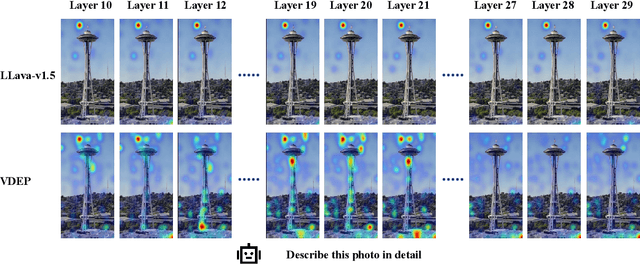

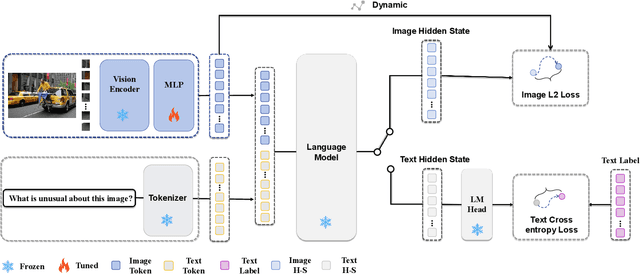

Abstract:While MLLMs perform well on perceptual tasks, they lack precise multimodal alignment, limiting performance. To address this challenge, we propose Vision Dynamic Embedding-Guided Pretraining (VDEP), a hybrid autoregressive training paradigm for MLLMs. Utilizing dynamic embeddings from the MLP following the visual encoder, this approach supervises image hidden states and integrates image tokens into autoregressive training. Existing MLLMs primarily focused on recovering information from textual inputs, often neglecting the effective processing of image data. In contrast, the key improvement of this work is the reinterpretation of multimodal alignment as a process of recovering information from input data, with particular emphasis on reconstructing detailed visual features.The proposed method seamlessly integrates into standard models without architectural changes. Experiments on 13 benchmarks show VDEP outperforms baselines, surpassing existing methods.
FedPAW: Federated Learning with Personalized Aggregation Weights for Urban Vehicle Speed Prediction
Dec 02, 2024

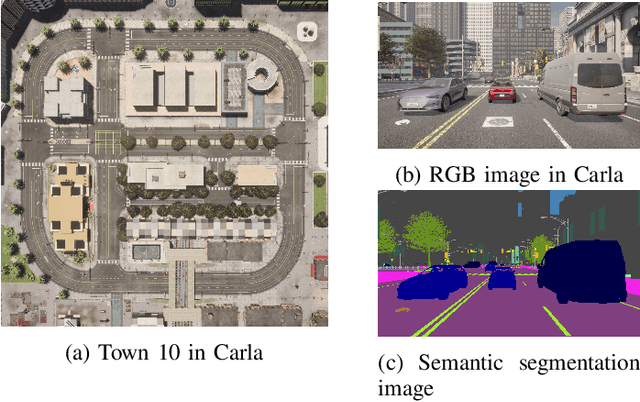

Abstract:Vehicle speed prediction is crucial for intelligent transportation systems, promoting more reliable autonomous driving by accurately predicting future vehicle conditions. Due to variations in drivers' driving styles and vehicle types, speed predictions for different target vehicles may significantly differ. Existing methods may not realize personalized vehicle speed prediction while protecting drivers' data privacy. We propose a Federated learning framework with Personalized Aggregation Weights (FedPAW) to overcome these challenges. This method captures client-specific information by measuring the weighted mean squared error between the parameters of local models and global models. The server sends tailored aggregated models to clients instead of a single global model, without incurring additional computational and communication overhead for clients. To evaluate the effectiveness of FedPAW, we collected driving data in urban scenarios using the autonomous driving simulator CARLA, employing an LSTM-based Seq2Seq model with a multi-head attention mechanism to predict the future speed of target vehicles. The results demonstrate that our proposed FedPAW ranks lowest in prediction error within the time horizon of 10 seconds, with a 0.8% reduction in test MAE, compared to eleven representative benchmark baselines. The source code of FedPAW and dataset CarlaVSP are open-accessed at: https://github.com/heyuepeng/PFLlibVSP and https://pan.baidu.com/s/1qs8fxUvSPERV3C9i6pfUIw?pwd=tl3e.
FedRAV: Hierarchically Federated Region-Learning for Traffic Object Classification of Autonomous Vehicles
Nov 21, 2024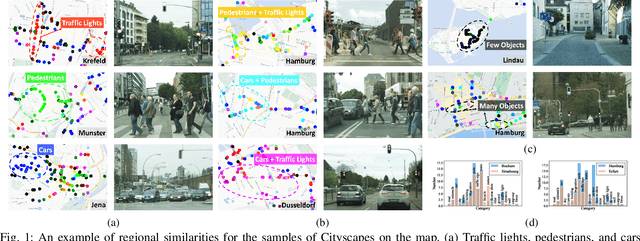
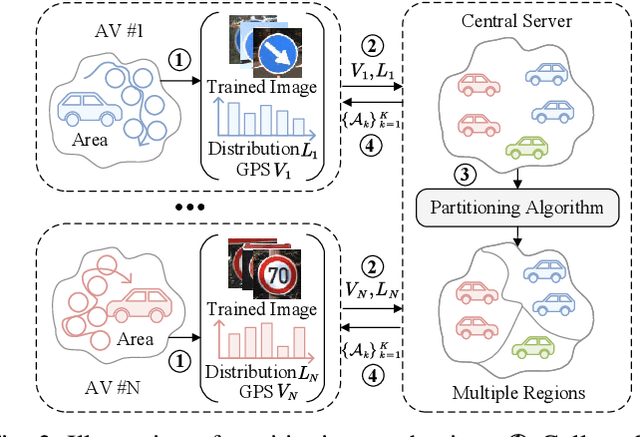


Abstract:The emerging federated learning enables distributed autonomous vehicles to train equipped deep learning models collaboratively without exposing their raw data, providing great potential for utilizing explosively growing autonomous driving data. However, considering the complicated traffic environments and driving scenarios, deploying federated learning for autonomous vehicles is inevitably challenged by non-independent and identically distributed (Non-IID) data of vehicles, which may lead to failed convergence and low training accuracy. In this paper, we propose a novel hierarchically Federated Region-learning framework of Autonomous Vehicles (FedRAV), a two-stage framework, which adaptively divides a large area containing vehicles into sub-regions based on the defined region-wise distance, and achieves personalized vehicular models and regional models. This approach ensures that the personalized vehicular model adopts the beneficial models while discarding the unprofitable ones. We validate our FedRAV framework against existing federated learning algorithms on three real-world autonomous driving datasets in various heterogeneous settings. The experiment results demonstrate that our framework outperforms those known algorithms, and improves the accuracy by at least 3.69%. The source code of FedRAV is available at: https://github.com/yjzhai-cs/FedRAV.
 Add to Chrome
Add to Chrome Add to Firefox
Add to Firefox Add to Edge
Add to Edge